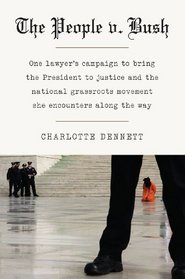Search -
The People V. Bush: One Lawyer’s Campaign to Bring the President to Justice and the National Grassroots Movement She Encounters Along the Way
The People V Bush One Lawyers Campaign to Bring the President to Justice and the National Grassroots Movement She Encounters Along the Way
Author:
When journalist-turned-lawyer Charlotte Dennett became outraged that Bush White House officials were acting above the law, she did something that surprised even herself. She ran for a state attorney general seat on a platform to prosecute George W. Bush for murder. She lost the race, but found a movement—one that continues its quest to hold lead... more »
Author:
When journalist-turned-lawyer Charlotte Dennett became outraged that Bush White House officials were acting above the law, she did something that surprised even herself. She ran for a state attorney general seat on a platform to prosecute George W. Bush for murder. She lost the race, but found a movement—one that continues its quest to hold lead... more »
ISBN-13: 9781603582094
ISBN-10: 1603582096
Publication Date: 1/25/2010
Pages: 296
Rating: ?
ISBN-10: 1603582096
Publication Date: 1/25/2010
Pages: 296
Rating: ?
0 stars, based on 0 rating
Publisher: Chelsea Green Publishing
Book Type: Paperback
Members Wishing: 0
Reviews: Amazon | Write a Review
Book Type: Paperback
Members Wishing: 0
Reviews: Amazon | Write a Review
Genres:
- Biographies & Memoirs >> Professionals & Academics >> Lawyers & Judges
- Politics & Social Sciences >> Politics & Government >> Specific Topics >> Human Rights
- Politics & Social Sciences >> Politics & Government >> United States >> Executive Branch




